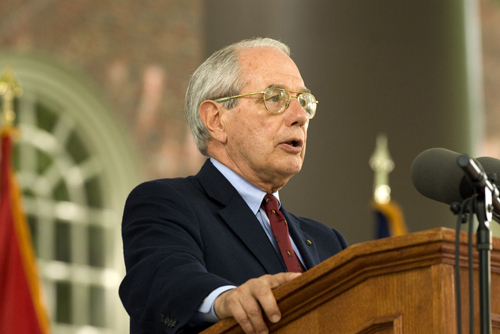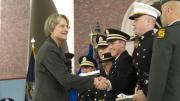The eight graduating Harvard seniors about to be commissioned as military officers on June 3 had already received an exceptional education, General David H. Petraeus, Commander, U.S. Central Command, noted: a Harvard degree, and an excellent Reserve Officers’ Training Corps (ROTC) program. “As you prepare for your first assignments,” he told them, “you should draw confidence from the fact that you are well prepared for what lies ahead.”
Petraeus therefore kept his advice to the seniors pithy. He joked that, given 10 minutes to speak, he’d asked a colleague how he could possibly impart everything he knew in that short interval, and the colleague had replied, “Sir, I suggest you speak very slowly”—a joke Petraeus acknowledged was swiped from George Bernard Shaw (“There is a footnote in the speech, but thanks for laughing”).
The general then presented five “critical admonitions for effective leadership”:
- Lead by example. “Your troopers will look to you and follow your lead.” Keep a good attitude; it spreads.
- Be humble. The people you’ll be leading already have on-the-ground conflict experience. “Listen and learn.”
- Don’t hesitate to make decisions. “When the listening is done and the time for decision has arrived, you have to make the call….There will be many moments when all eyes turn to you for a decision. Be prepared for them. Don’t shrink from them. Embrace them.”
- Be a team player. “Your team’s triumphs and failures will, obviously, be yours.”
- Don’t take yourself too seriously, but do take your work seriously. “Your troopers want someone who knows his or her profession and is technically and tactically competent, not someone who is too cool for school.”
Although there is considerable tension about the fact that Harvard ROTC cadets must travel to MIT for their classes (see articles here and here), Petraeus praised President Drew Faust for her “navigation of the always tricky waters that swirl around institutions of higher learning.”
“It is clear,” he said, “that Harvard is in very good hands indeed.”

Photograph by Jim Harrison
Darnell M. Whitt
The fiftieth-reunion speaker, retired U.S. Navy Captain Darnell M. Whitt ’59, recalled that his own commissioning ceremony had involved 121 cadets, and said the United States needs a large corps of officers who may not plan on a military career, but are ready to step into service if needed.
“We congratulate you for your personal achievements,” he told the cadets, but added that 50 years from now—when one of the officers commissioned in 2009 stands up to give a similar address to the ROTC class of 2059—“I hope that number will be much greater than the few in your cohort.”
The status of ROTC at Harvard couldn’t have been far from anyone’s mind. Whitt lamented the program's unofficial status, and as the audience waited for the ceremony to begin, the Advocates for Harvard ROTC distributed a newsletter reaffirming their goals: formal recognition of ROTC by the Harvard Corporation; a tri-service ROTC office annex on campus; and increased participation of Harvard undergraduates in ROTC.
When Faust said, upon taking the stage, that she had an announcement to make, the crowd went silent. The announcement, it turned out, was nothing to do with ROTC, but prompted spirited applause nonetheless.
Faust said the University will participate in the Yellow Ribbon GI Education Enhancement Program, in which Harvard will allocate funds—matched dollar for dollar by the U.S. Department of Veterans Affairs—to pay tuition for military veterans. Harvard College, the Extension School, and all of the graduate and professional schools will participate, she said: “Under this partnership, as many as 150 veterans will be able to receive substantial assistance to study at Harvard this fall.” (Read the official University news release here.)
The program website includes a list of participating schools. (A check of the website immediately following Faust’s remarks found that the list did not yet include Harvard; schools have until June 15 to notify the government that they plan to participate.)
Faust went on to laud Petraeus’s devotion to “the ideal of the soldier scholar.” He is a good leader in many ways, she said, but “one of the most important is that he is a thinker.” She quoted from his writings: “The most powerful tool any soldier carries is not his weapon but his mind.”
A Harvard education, she told the new officers, “has taught you to think, to analyze, to make judgments, to turn information into understanding.” They, too, are soldier scholars, she said—and challenged them to remain so, and conduct their careers accordingly.
“War,” she said, “is arguably the most consequential activity any nation or society can undertake. …War represents the proverbial moment of truth, where we define ourselves, our most fundamental purposes and values.”
Faust presented each new officer with a copy of Just and Unjust Wars by Michael Walzer, a former Harvard professor of government, and quoted one sentence: “War is the hardest place; if comprehensive and consistent moral judgments are possible there, they are possible everywhere.”
“To you," she said, "we entrust this enormous complexity.”






